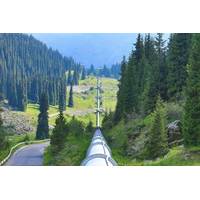UK Struggles With Shale Gas Laws
British PM Cameron says still wants shale gas to go ahead; government, industry have met to discuss shale gas.
Pressure is mounting on Britain's pro-shale government to make changes to the planning system after local politicians rejected two projects that could have become Britain's first shale gas producing wells.
Prime Minister David Cameron, who has promised to go "all out for shale", said he respected the planning process but still wanted shale gas to go ahead.
His quest to replicate at least a small slice of the United States' success in bringing down energy prices with the help of shale gas is now looking bleaker than ever. In order to save his dream, Cameron has to reform the planning system to give the government the final say in approving new projects, legal experts and industry representatives said.
Discussions have already taken place between the government and shale gas developers in which industry representatives have urged politicians to adjust policies, industry sources said.
"Government just needs to step up. They can't sit back and say 'we support this industry' but have a process in place which is clearly not working," said David Messina, managing director of Hutton Energy, an oil and gas explorer that has submitted bids for new shale gas licences in Britain.
A small group of local government politicians in a town near Blackpool on Britain's northwest coast stunned the energy industry late last month when they refused planning permission for a Cuadrilla Resources shale gas project, ignoring legal and technical advice.
"This is clearly a very important decision and a major setback for the shale industry," said Michael Pocock, planning lawyer at law firm Pinsent Masons.
Only one shale gas well in Britain has been hydraulically fractured, also referred to as fracking, and was later abandoned. Since then, only three shale gas fracking applications have been made, two by Cuadrilla, which have now been refused, and one by energy company Third Energy.
In contrast, 45,000 shale oil and gas wells were drilled in the United States in 2013 alone, according to the American Petroleum Institute.
Fracking has drawn vocal opposition in Britain from anti-fossil fuel campaigners and local residents, some protesting against the environmental threats posed by fracking fluids and others against the prospect of their house prices sliding.
The councillors rejected Cuadrilla's applications on the grounds of the projects' visual and traffic impact.
Cuadrilla can now appeal against the decisions, a process that would take at least eight months, according to a planning lawyer, but which could ultimately mean the permit is approved because the central government could intervene. Cuadrilla said it was still considering how to proceed.
For the long term, Cameron has a number of options that could remove the hurdles which have so far stood in the way, including giving shale gas a special status that would let the government grant planning consents.
His decision to push forward shale gas development stands in contrast to opposition in other European countries, such as Germany, France and the Netherlands whose governments have banned the use of fracking technology, at least temporarily.
Planning approvals for a number of so-called nationally significant energy infrastructure projects, including nuclear power plants, airports or water supply sites, are given directly by the central government, but shale gas does not currently belong in this category.
Shale gas developers are desperate for a change to those rules, fearing if nothing changes their projects are seriously jeopardised.
"If the government genuinely perceives it (shale gas) as strategically important energy resource, they need to make the planning process more efficient," said Jim Ratcliffe, Chairman of Swiss chemicals company INEOS that has pledged to invest $1 billion in British shale gas development.
By Karolin Schaps and Susanna Twidale




